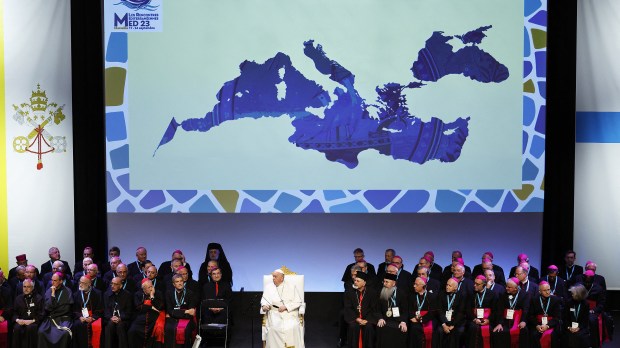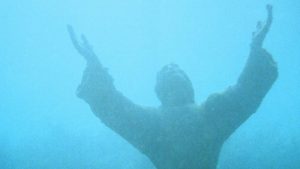From September 22 to 23, 2023, Pope Francis is in Marseille, France, to take part in the third edition of the Mediterranean Meetings (Rencontres Méditerranéennes). At the heart of this initiative is an idea that Pope Francis has developed throughout his travels: the theology of the Mediterranean.
In Marseille, this field of research is the specialty of the Catholic Institute of the Mediterranean (Institut Catholique de la Méditerranée, ICM), which was founded by the current archbishop of Marseille, Cardinal Jean-Marc Aveline, in the 1990s.
Comprising the Institute of Science and Theology of Religions, the University Institute of St. Luke, and the association Paths of Dialogue, the ICM is organizing several events occurring during the Mediterranean Meetings, including a conference for theologians, round tables with representatives of different religions, and visits to various places of worship in Marseille.
Father Patrice Chocholski, director of the ICM, explains to I.MEDIA why the theology of the Mediterranean is important for the Church today, and why it is central to the Pope’s thinking.
What is the ‘theology of the Mediterranean’ referred to by Pope Francis and Cardinal Aveline?
Father Chocholski: It’s a theology based on dialogue, on concrete people, on the history, challenges, flavors, feelings, passions and trials of the Mediterranean. Etymologically speaking, the Mediterranean is already ‘between lands’; it represents a relational ‘in-between’. Mediterranean ports face the sea rather than the continent, so it’s a theology of listening and dialogue. Mediterranean people are accustomed to this relational in-between; they know that they can come to themselves through the other. There’s a part of the other shore within them.
At the heart of this theology is a mysterious word that brings everyone into being: logos [in ancient Greek philosophy, this word means “word, discourse”]. It is this mysterious ‘word of love’ that Pope Francis also talks about in the speech he gave in Naples in 2019.
In our Christian faith, we believe that this logos and dialogos became flesh in Jesus, the Son of God, who is witness to an eternal dialogue, since He Himself is always in dialogue with the Father. This logos engages us in an eternal dialogue with everyone. This theology believes that dialogue and everyday encounters become a place of revelation: God is dialogue, and dialogue is the place of God.
God is dialogue, and dialogue is the place of God.
Why do you think Cardinal Aveline and Pope Francis see the Mediterranean as a place of learning and encounter for the Church and the world today?
Father Chocholski: In the Mediterranean we are very used to talking to one another: We talk to each other on the bus, in the supermarket, everywhere, and we’re not afraid of the other. There’s a particular grace here that could influence the whole theology of the Church throughout the world. I’m well aware of the importance the Pope, like the Cardinal, attaches to the Mediterranean Meetings.
If, through dialogue, we manage to understand each other and to express our differences in friendship – and this will be the case during these Meetings – this will also be a message for other regions of the world. If this is possible in the Mediterranean, which is such a tense, fractured region, it will undoubtedly be a message for other continents.
There’s no doubt that this dialogue, this Mediterranean spirit, this attention to the service of Mediterranean peoples has long been in the heart of our archbishop. He has worked a lot in this direction, in particular by founding the ICM.
So, when we heard Pope Francis’s 2019 address in Naples, we recognized ourselves and said: “This is wonderful, we’re not the only ones who think this way!” It’s with the other Mediterranean networks, in Italy, Lebanon, Croatia, and elsewhere that we realize that together we are strong. It’s a synergy. We all put ourselves on the same level. I think that’s the secret of working in a network.
We’re convinced that our uniqueness in Marseilles will make an important contribution to this process of the Mediterranean churches, and we’re also looking forward to the next stage, which will take place in another Mediterranean city. We know that, with our archbishop, we’ll always be active in this process, and we hope to see much fruit from this dialogue in the service of the peoples of the Mediterranean.
How did the Catholic Institute of the Mediterranean come into being?
Father Chocholski: The institute was founded by then-Father Jean-Marc Aveline in 1992, 31 years ago, on the basis of a synod of the diocese of Marseille. At the end of this gathering, a group of baptized people asked their archbishop, Cardinal Robert-Joseph Coffy at the time, to help better live the Mediterranean experience in the city of Marseille. This meant helping them understand better the religions of others to also be able to properly bear witness to Christ and the Christian faith.
The Archbishop of Marseille saw fit to call Father Aveline, who was a theologian at the time, to respond to the calls of the Synod. This is how the Institute of Science and Theology of Religions [now part of the ICM] came into being, with a few local theologians and then others.
For some 30 years now, the Institute has been working on this theology of the Mediterranean in a network with other institutions across the regions. This includes Naples, Barcelona, Beirut, Rabat, Tel-Aviv, Istanbul and elsewhere. We are aware that dialogue is at the origin of our theology, so it must also be practiced between theologians, in a network.


